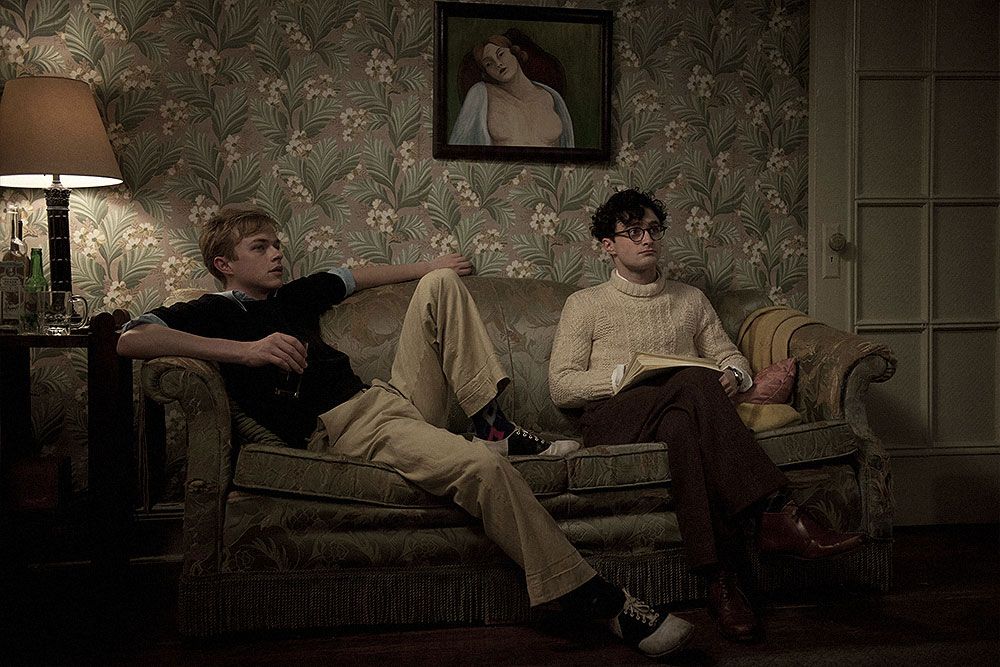Without some mooring in the work of Allen Ginsberg, William Burroughs and Jack Kerouac, or even just a bit of Beat Generation history, you may find yourself a little lost in Kill Your Darlings, John Krokidas’ retelling of a pivotal moment from the early days of one of the 20th century’s most influential literary movements. More accurately a tableau of youthful idealism given weight by the tragedy of first-time romance, Krokidas’ film utilizes the jazzy rhythms of the Beats to highlight how teenagers then and now are basically all the same – namely, susceptible to larger-than-life personalities whose betrayals and disappointments, perhaps more than anything else, help form their view of the world as adults.
Daniel Radcliffe plays Ginsberg, the son of New York intellectual Louis Ginsberg (David Cross), who leaves home to study at NYU despite the encroaching mental illness of his mother Naomi (Jennifer Jason Leigh). Initially absorbed by his studies, which champion tradition over innovation, he quickly succumbs to more disruptive creative impulses, especially after he meets Lucien Carr (Dane DeHaan), a charismatic classmate whose anarchic philosophies prove irresistible.
Teaming up with William Burroughs (Ben Foster) and Jack Kerouac (Jack Huston) to test the boundaries of literary propriety, much less social acceptance, Allen begins to discover his voice as a writer, even as he starts to acknowledge feelings for Lucien that are stronger than friendship. But when David Kammerer (Michael C. Hall), an old acquaintance of Lucien’s, is killed, Allen is forced to choose between his friend and a truth that threatens to ruin the freedom, creativity and solidarity of their group.
Although I am admittedly unfamiliar with most of the Beat Generation authors and their work, what Kill Your Darlings does fairly well is at least capture the spirit of possibility that seemed ubiquitous during the time of their ascendancy. Ignoring the backdrop of World War II except to offer a few pointed jabs at the comparatively insular life of Ginsberg and his colleagues, the film celebrates the irreverence and the freedom of their beliefs, elevating that pedestal they still sit upon rather, than, say, demystifying them, or perhaps more crucially, pointing out how their philosophy is different, better, or more insightful than others. Krokidas’ affection for these authors is palpable, but his approach doesn’t distinguish them from the score of other films about characters – fictional and real – who stood up against an institution or outdated leadership or general fuddy-duddyism and challenged the status quo.
Radcliffe is maturing into a fine actor, and gives a convincing performance as Ginsberg in both his naïve and rebellious phases. But his fearlessness in taking on a gay role notwithstanding – which, thankfully, the film is entirely comfortable with – Radcliffe seems to be on a condensed version of the journey he took as Harry Potter, slowly discovering a larger world than the one he knew, and struggling to find confidence as his victories and defeats help define him as an adult. As Lucien, meanwhile, DeHaan perfectly embodies the kind of irresistible troublemaker that we’ve all been drawn to, but history’s lack of certainty about his adolescence undermines the possibility of a performance as confident as the character initially appears to be.
Like many coming-of-age films, Krokidas’ feature debut will no doubt appeal to audiences that are themselves coming of age at the time that they’re watching it. Each generation deserves, and probably needs its own seminal film about learning how to think, and discovering how disillusionment and disappointment can be particularly educational. But if you’re familiar with past ones, and possess even with minimal knowledge of the Beat authors, there’s nothing here that you haven’t seen before, and nothing new to learn. Kill Your Darlings, as a title and an idea, serves as a metaphor for Ginsberg’s epiphanies, but it’s also a lesson the filmmakers should have taken more to heart, because their reverence to their subjects ends up making them a lot less unique, and interesting, than they probably were.
Kill Your Darlings is playing now in limited release.


